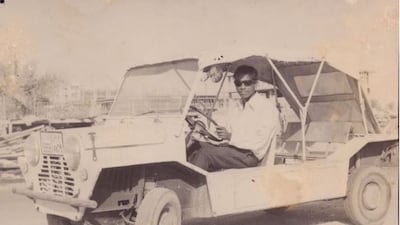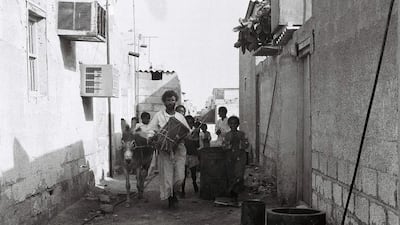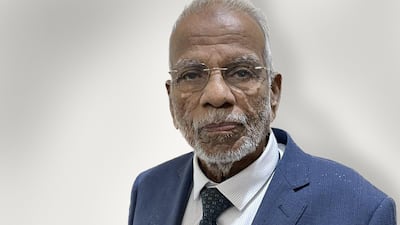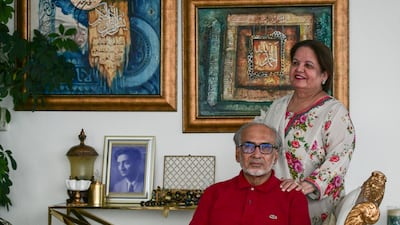The month of Ramadan opens a floodgate of memories for 81-year-old Bava Haji Pandalingal, who moved to Abu Dhabi from India in 1968, before the UAE was formed.
Mr Pandalingal, originally from Kerala, is the President of the Indian Islamic Centre — a social and cultural organisation of Keralite residents in Abu Dhabi.
He vividly remembers his first face-to-face with the UAE Founding Father, the late Sheikh Zayed bin Sultan, during one of his first Ramadans in the country.
“I was in my mid-20s and new to the country. I remember standing in line outside his palace in Abu Dhabi along with other residents and Emiratis to meet him,” Mr Pandalingal told The National.
“When my turn came, I greeted him 'Ramadan Kareem' and he gave me a handful of dates.”
There were no big shopping malls to hang out in all night or elaborate Iftars or Suhoors. Ramadan was much quieter.
Bava Haji Pandalingal
“It was a norm for people to greet the ruler. People used to look forward to that opportunity every Ramadan. The month was spent in prayer and spiritual introspection, otherwise.”
Reminiscing about how people observed fasting during those times, when there was no air conditioning or efficient water supply, Mr Pandalingal said it was all about making the most from the modest means at their disposal.
In the 1960s, after the first barrel of oil was exported, workers from different parts of the world arrived in Abu Dhabi to help build the many infrastructure projects that had started.
Concrete buildings were rising from the desert, but many families still lived in shanties or mud houses. Desalination of seawater had begun and people were storing fresh water in sand pits or metal cans.
“Donkeys carrying fresh water in leather pouches were used to supply households,” said Mr Pandalingal, who has witnessed the country’s transformation over the last half a century.
“A gallon would cost equivalent to a dirham. We were so careful while using water. But during Ramadan our water supplies lasted longer because we were fasting during the day.
“There were no big shopping malls to hang out in all night or elaborate iftars or suhoors. Ramadan was much quieter.”
Mr Pandalingal worked in the planning section of Abu Dhabi municipality and later started his own contracting company in 1994. His wife Khadeeja joined him after a few years. The couple has four children, all grown up and settled in the UAE and India.
He said they used to live in temporary tents in a compound shared with many other India nationals.
“There were not many families at that time. We used to cook but as bachelors we mostly relied on the few cafes and small restaurants that sold Indian snacks during iftar,” said Mr Pandalingal.
“Shopping was not a pastime, like it is today. But we used to hang out with friends in the souq in the central market, which was the main shopping and trading hub.
“Vendors would have a special display during Ramadan and we used to buy some incense, spices and some clothes.
“There are not as many mosques too. There was one big mosque near the central market, and people would gather there for prayers.
“Over the years, everything changed — even the way people break fast and how they spend the evenings. But change is inevitable and I feel lucky I get to experience both worlds.”
Making Ramadan special
Pakistani couple Khawar Saleem Aslam and Shabana Khawar also lived through an era when modern amenities and extravagant lifestyles were a distant dream.
Mr Aslam, an engineer, came to Abu Dhabi in 1976 to work in Umm Al Nar oil refinery in Sas Al Nakhl. The couple has four daughters and all of them have joined their parents in Abu Dhabi this Ramadan.
But when they were starting their life in a new country, nearly 50 years ago, they only had friends and community members to make Ramadan special.
“I was 25 at that time and my wife joined me a year later,” Mr Aslam, from Lahore, told The National.
“We were a young couple building a new life in a faraway country. Our first Ramadan together in Abu Dhabi was very special as it was the first time we were away from our families.
“There was nothing dramatic during Ramadan. I remember we had to walk a bit to reach the closest mosque for morning prayers. People quietly went about doing their work.
“By evening, small street-side stalls would spring up in our neighbourhood, selling hot samosas, pakoras [spicy fritters] and other traditional snacks. Dinner was mostly at home with a few other neighbours and friends.”
Mrs Khawar said she had to work around some recipes because fresh milk was not available in Abu Dhabi in the 1970s.
“We were using milk powder and desserts like Kheer [sweet rice pudding] would taste different,” she said.
“We were sharing an apartment with another Pakistani family. Me and my friend used to go shopping when our husbands were away and we used to explore the souq.
“We enjoyed cooking and joint iftars because there were friends who were like family.”
Mr Alam said one big difference he has seen over the years is how the community has become more tolerant and inclusive, even during Ramadan.
“All the restaurants remained closed during Ramadan and it was difficult for non-Muslims to find food or eat during the holy month,” he said.
“But as the country grew and is home to people from all over the world and of different religions, races and belief systems, I see that we have also become more open and tolerant in the true spirit of the holy month.”
Ramadan in the UAE — in pictures
World Cup final
Who: France v Croatia
When: Sunday, July 15, 7pm (UAE)
TV: Game will be shown live on BeIN Sports for viewers in the Mena region
The biog
Prefers vegetables and fish to meat and would choose salad over pizza
Walks daily as part of regular exercise routine
France is her favourite country to visit
Has written books and manuals on women’s education, first aid and health for the family
Family: Husband, three sons and a daughter
Fathiya Nadhari's instructions to her children was to give back to the country
The children worked as young volunteers in social, education and health campaigns
Her motto is to never stop working for the country
Pharaoh's curse
British aristocrat Lord Carnarvon, who funded the expedition to find the Tutankhamun tomb, died in a Cairo hotel four months after the crypt was opened.
He had been in poor health for many years after a car crash, and a mosquito bite made worse by a shaving cut led to blood poisoning and pneumonia.
Reports at the time said Lord Carnarvon suffered from “pain as the inflammation affected the nasal passages and eyes”.
Decades later, scientists contended he had died of aspergillosis after inhaling spores of the fungus aspergillus in the tomb, which can lie dormant for months. The fact several others who entered were also found dead withiin a short time led to the myth of the curse.
Benefits of first-time home buyers' scheme
- Priority access to new homes from participating developers
- Discounts on sales price of off-plan units
- Flexible payment plans from developers
- Mortgages with better interest rates, faster approval times and reduced fees
- DLD registration fee can be paid through banks or credit cards at zero interest rates
DUBAI WORLD CUP RACE CARD
6.30pm Meydan Classic Trial US$100,000 (Turf) 1,400m
7.05pm Handicap $135,000 (T) 1,400m
7.40pm UAE 2000 Guineas Group Three $250,000 (Dirt) 1,600m
8.15pm Dubai Sprint Listed Handicap $175,000 (T) 1,200m
8.50pm Al Maktoum Challenge Round-2 Group Two $450,000 (D) 1,900m
9.25pm Handicap $135,000 (T) 1,800m
10pm Handicap $135,000 (T) 1,400m
The National selections
6.30pm Well Of Wisdom
7.05pm Summrghand
7.40pm Laser Show
8.15pm Angel Alexander
8.50pm Benbatl
9.25pm Art Du Val
10pm: Beyond Reason
Russia's Muslim Heartlands
Dominic Rubin, Oxford
Specs
Engine: Electric motor generating 54.2kWh (Cooper SE and Aceman SE), 64.6kW (Countryman All4 SE)
Power: 218hp (Cooper and Aceman), 313hp (Countryman)
Torque: 330Nm (Cooper and Aceman), 494Nm (Countryman)
On sale: Now
Price: From Dh158,000 (Cooper), Dh168,000 (Aceman), Dh190,000 (Countryman)
MATCH INFO
Uefa Champions League semi-final, first leg
Bayern Munich v Real Madrid
When: April 25, 10.45pm kick-off (UAE)
Where: Allianz Arena, Munich
Live: BeIN Sports HD
Second leg: May 1, Santiago Bernabeu, Madrid
Specs
Engine: Duel electric motors
Power: 659hp
Torque: 1075Nm
On sale: Available for pre-order now
Price: On request
Milestones on the road to union
1970
October 26: Bahrain withdraws from a proposal to create a federation of nine with the seven Trucial States and Qatar.
December: Ahmed Al Suwaidi visits New York to discuss potential UN membership.
1971
March 1: Alex Douglas Hume, Conservative foreign secretary confirms that Britain will leave the Gulf and “strongly supports” the creation of a Union of Arab Emirates.
July 12: Historic meeting at which Sheikh Zayed and Sheikh Rashid make a binding agreement to create what will become the UAE.
July 18: It is announced that the UAE will be formed from six emirates, with a proposed constitution signed. RAK is not yet part of the agreement.
August 6: The fifth anniversary of Sheikh Zayed becoming Ruler of Abu Dhabi, with official celebrations deferred until later in the year.
August 15: Bahrain becomes independent.
September 3: Qatar becomes independent.
November 23-25: Meeting with Sheikh Zayed and Sheikh Rashid and senior British officials to fix December 2 as date of creation of the UAE.
November 29: At 5.30pm Iranian forces seize the Greater and Lesser Tunbs by force.
November 30: Despite a power sharing agreement, Tehran takes full control of Abu Musa.
November 31: UK officials visit all six participating Emirates to formally end the Trucial States treaties
December 2: 11am, Dubai. New Supreme Council formally elects Sheikh Zayed as President. Treaty of Friendship signed with the UK. 11.30am. Flag raising ceremony at Union House and Al Manhal Palace in Abu Dhabi witnessed by Sheikh Khalifa, then Crown Prince of Abu Dhabi.
December 6: Arab League formally admits the UAE. The first British Ambassador presents his credentials to Sheikh Zayed.
December 9: UAE joins the United Nations.
THE BIO: Martin Van Almsick
Hometown: Cologne, Germany
Family: Wife Hanan Ahmed and their three children, Marrah (23), Tibijan (19), Amon (13)
Favourite dessert: Umm Ali with dark camel milk chocolate flakes
Favourite hobby: Football
Breakfast routine: a tall glass of camel milk
SPECS
Nissan 370z Nismo
Engine: 3.7-litre V6
Transmission: seven-speed automatic
Power: 363hp
Torque: 560Nm
Price: Dh184,500
Tips to stay safe during hot weather
- Stay hydrated: Drink plenty of fluids, especially water. Avoid alcohol and caffeine, which can increase dehydration.
- Seek cool environments: Use air conditioning, fans, or visit community spaces with climate control.
- Limit outdoor activities: Avoid strenuous activity during peak heat. If outside, seek shade and wear a wide-brimmed hat.
- Dress appropriately: Wear lightweight, loose and light-coloured clothing to facilitate heat loss.
- Check on vulnerable people: Regularly check in on elderly neighbours, young children and those with health conditions.
- Home adaptations: Use blinds or curtains to block sunlight, avoid using ovens or stoves, and ventilate living spaces during cooler hours.
- Recognise heat illness: Learn the signs of heat exhaustion and heat stroke (dizziness, confusion, rapid pulse, nausea), and seek medical attention if symptoms occur.
yallacompare profile
Date of launch: 2014
Founder: Jon Richards, founder and chief executive; Samer Chebab, co-founder and chief operating officer, and Jonathan Rawlings, co-founder and chief financial officer
Based: Media City, Dubai
Sector: Financial services
Size: 120 employees
Investors: 2014: $500,000 in a seed round led by Mulverhill Associates; 2015: $3m in Series A funding led by STC Ventures (managed by Iris Capital), Wamda and Dubai Silicon Oasis Authority; 2019: $8m in Series B funding with the same investors as Series A along with Precinct Partners, Saned and Argo Ventures (the VC arm of multinational insurer Argo Group)


















